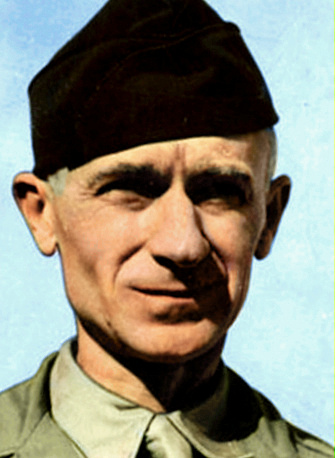Poll: Public opposes labor practice of make-work
66% want law to prohibit it
By George Gallup, Director, American Institute of Public Opinion
…
66% want law to prohibit it
By George Gallup, Director, American Institute of Public Opinion
…

By Ernie Pyle
WITH THE MARINES ON OKINAWA BEACHHEAD (by Navy radio) – You wouldn’t believe it. and we don’t either. It just can’t be true. And yet it is true.
The regiment of Marines that I am with landed this morning on the beaches of Okinawa and were absolutely unopposed, which is indeed an odd experience for a Marine.
Nobody among us had dreamed of such a thing. We all thought there would be slaughter on the beaches. There was some opposition to the right and to the left of us, but on our beach, nothing, absolutely nothing.
We don’t expect this to continue, of course. A Marine doesn’t fool himself like that. Certainly, there will be hard fighting ahead and we all have our fingers crossed. But to get the firm foothold we have, with most of our men ashore and our supplies rolling in, is a gift for which we are grateful.
More like home
This is Easter Sunday morning. It is a beautiful one. One of the Marines, after spending months in the tropics, remarked a while ago, “This weather feels more like American weather than anything since I left home.”
It is sunshiny and very warm. We had heard it would be cold and many of the boys wore heavy underwear. Now we are sweating and regretting. I wore two pairs of pants, but I am about to take off one of them.
We are dressed in green herringbone combat uniforms. Everybody made the trip in khaki and changed this morning aboard ship. The men left their old khaki lying on their bunks and they’ll be collected by the Navy, cleaned and used to clothe prisoners and our own casualties who have lost their clothes.
On our ship we were up to 4 a.m. We had done our final packing of gear last night. We brought ashore only what we could carry on our backs. When we put on our new green fatigues, one Marine remarked, “the latest Easter style – herringbone twill.”
Wonderful feeling
My schedule for landing was an early one. I was ashore a short time after the first wave. Correspondents were forbidden to go before the fifth wave. I was on the seventh.
I had dreaded the sight of the beach littered with mangled bodies. My first look up and down the beach was a reluctant one. And then like a man in the movies who looks and looks away and then suddenly looks back unbelieving. I realized there were no bodies anywhere – and no wounded. What a wonderful feeling!
In fact, our entire regiment came ashore with only two casualties. One was a Marine who hurt his foot getting out of an amphibious truck. And the other was, of all things, a case of heat prostration!
And to fulfill the picnic atmosphere, listen to this–
Aboard ship we had turkey dinner last night. So, this morning they fixed me up with a big snack of turkey wings, bread, oranges and apples. So instead of grabbing a hasty bite of K rations our first meal ashore, we sat and lunched on turkey wings and oranges.
Nice Easter
There are low chalky cliffs on this island. In these cliffs are caves. In the caves are brick-colored urns a couple of feet high. And in these urns are the ashes of many honorable ancestors.
Our bombardment had shattered many of these burial vaults. What our big guns missed, the soldiers and Marines took a precautionary look into by prying off the stone slabs at the entrances.
In front, looking out to sea, stands our mighty fleet with scores of little black lines extending to shore – our thousands and thousands of landing craft bringing more men and big guns and supplies.
And behind me, not two feet away, is a cave full of ex-Japanese, which is just the way it should be. What a nice Easter Sunday after all.

By Maj. Al Williams
If our purpose in the Pacific is complete destruction of the heart of the Japanese war machine and surrender of the lords of Japan proper, then we face a comparatively short war, economical above all else in manpower losses.
If, on the other hand, our strategy involves the invasion of the Asiatic continent and the destruction of the four to six million Jap soldiers there, we face a long, bloody war.
This decision, one of the most momentous in American military history, is in the making or perhaps already made.
I believe we must assume that our war aim against Japan is the elimination of that nation as a potential aggressor in the immediate future – and as far ahead as we can plan. Second, if this is our aim, then continuing the naval air drive against Japan. aided by long-range bombing operations of the Army, is a most logical development of our strategy. In other words, instead of starting at the southernmost extension of the newly-won Japanese Empire and working our way laboriously northward to attack Japan proper, our naval air-sea forces took the shortcut and scissored the Jap lines of communication in the middle. As a result, no seaborne Jap munitions can supply garrisons to the southward.
The major percentage of Jap aircraft, engine and munitions factories are in Japan. Demolish those factories by intensive bombing and the Jap war machine must fold. Nothing can save it because modern warfare means production and transportation.
The day must inevitably come when the last Jap fighter plane factory in Japan will be destroyed, and the last Jap fighter plane will rise to attack our bombers. From then on, the only defense against our bombing operations will be anti-aircraft fire. The Germans couldn’t stand up under the constant day and night bombardment, even though they still possessed some fighter forces. But the first complete vacancy in Japanese defense against our continued bombing of the homeland will be the elimination of Jap fighters. With that accomplished, what is there to prevent us from ringing Japan proper with our carriers and bombing its facilities and its population to submission?
Japan is a concentrated target. There isn’t enough room in Japan to hide munition producing facilities. That narrow little island is teeming with people who must be fed. And to feed them food must be grown (fishing will be “out” with our complete control of the seas adjacent to Japan). Food must be transported, and that’s where our bombing of Japan’s railroads and highways will sever another artery of national life.
Japan is an insular power that has lost control of the sea and of the air. Militarily isolated she has nothing ahead of her except piecemeal destruction and ultimate surrender. The Japanese people without food and without the means of life may surrender. We already know from our swelling manpower losses that the Jap armed forces will never surrender and must be killed.
Japan is truly an airpower target.
Belief that both powers are retreating before Russian demands wrecks prestige
By William Philip Simms, Scripps-Howard foreign editor
…
By Gracie Allen
Well, I’ve just read about the most wonderful invention since the telephone. It’s a jukebox into which you drop a coin and buy three minutes of silence instead of jumpin’ jive. Now, if the scientists can just figure out how to do that with human beings!
My goodness, if you could drop coins in people and get silence. Dr. Goebbels would be so full of metal that they couldn’t hoist him up to a microphone with a derrick.
Mr. Roosevelt would be over in Congress every day, dropping coins in Southern Democrats. And before elections, candidates would go around clanking like wartime autos.
And wouldn’t it be nice, when you’re having a dinner party and your lesser half begins telling that old one about the time he almost made a hole-in-one, if you could whisper to the maid, “Terese, drop a nickel in you-know-who.”
Indian chief’s feathered headdress is reproduced on rayon jersey
By Maxine Garrison
…
Time enough for it when war is over, troops needed at front, they say
By Judy Barden, North American Newspaper Alliance
…
Ostermueller, Camelli to be inducted – Elliott takes fourth physical
…
Swedish people just LOVE spreading misinformation what’s going on in Nazi High Command.
Tokio, 4. April – Das Kaiserliche Hauptquartier gab bekannt:
Die amerikanischen Truppen, die auf der Hauptinsel Okinawa gelandet sind, haben im Küstengebiet schwere Verluste erlitten, doch ist ein großer feindlicher Truppenteil am 3. April werter südlich von der Landungsstelle in das Gebiet von Sunabutsu und Arashi eingedrungen. Die dortigen japanischen Truppen führen gegen diese Landungstruppen nach wie vor heftige Abwehrkämpfe.
In den Gewässern um Okinawa wurden der dort operierenden feindlichen Flotte folgende Verluste zugefügt:
Versenkt wurden sechs Transporter, ein Schlachtschiff, vier Kreuzer. In Brand gesetzt wurden ein Zerstörer und ein Kriegsschiff unbekannter Bauart.
Die japanischen Truppen setzen, wie Domei ferner meldet ihre Gegenangriffe gegen die feindlichen Invasionstruppen auf Okinawa fort Diese machen äußerste Anstrengungen, ihren Brückenkopf an der Westküste des Hauptteils der Insel wo sie am Sonntagvormittag landeten, zu erweitern. Unter dem Schutz einer starken Feuerglocke durch Kriegsschiffe ist es den Amerikanern gelungen, weitere Truppen zu landen.
Nach einer weiteren Mitteilung des Kaiserlichen Hauptquartiers setzt die japanische Luftwaffe ihre heftigen Angriffe auf feindliche Kriegsfahrzeuge in den Okinawa benachbarten Gewässern fort, in deren Verlauf weitere 31 Überwasserfahrzeuge versenkt oder schwer beschädigt wurden.